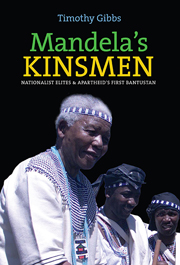Book contents
- Frontmatter
- Contents
- List of Maps and Figures
- Acknowledgements
- List of Abbreviations
- Introduction: Mandela' Kinsmen
- 1 Education, Monarchy & Nationalism
- 2 The First Bantustan, 1954–1963
- 3 The Second Peasants' Revolt, Mpondoland 1960–1980
- 4 The Old Mission Schools, 1963–1980
- 5 The Comrade-King, Bantustan Politics 1964–1980
- 6 Chris Hani's Guerrillas, 1974–1987
- 7 The Apartheid Endgame, 1987–1996
- 8 The New South Africa & Transkei's Collapse, 1990 onwards
- Conclusion: African Nationalism & its Fragments
- Bibliography
- Index
1 - Education, Monarchy & Nationalism
Published online by Cambridge University Press: 05 April 2014
- Frontmatter
- Contents
- List of Maps and Figures
- Acknowledgements
- List of Abbreviations
- Introduction: Mandela' Kinsmen
- 1 Education, Monarchy & Nationalism
- 2 The First Bantustan, 1954–1963
- 3 The Second Peasants' Revolt, Mpondoland 1960–1980
- 4 The Old Mission Schools, 1963–1980
- 5 The Comrade-King, Bantustan Politics 1964–1980
- 6 Chris Hani's Guerrillas, 1974–1987
- 7 The Apartheid Endgame, 1987–1996
- 8 The New South Africa & Transkei's Collapse, 1990 onwards
- Conclusion: African Nationalism & its Fragments
- Bibliography
- Index
Summary
The Morning Star
In 1938, during Nelson Mandela's final year in boarding school at Healdtown, ‘an event occurred that… was like a comet streaking across the night sky.’ The school was given an impromptu holiday to celebrate the performance of a famous imbongi (praise poet), Krune Mqhayi. A praise poet typically performed in the court of a king; but Mqhayi was a well-educated teacher who had left a comfortable post and retreated to the hills to pursue his calling. That night Healdtown witnessed Mqhayi perform his most famous poem. First Mqhayi subversively alluded to colonial conquest. Then he danced about the stage, waving his spear, allocating stars to the different peoples of the world: the Milky Way to the nations of Europe; other heavenly constellations to the peoples and kingdoms of Africa.
Now, suddenly, he became still and lowered his voice. ‘Now come, O House of Xhosa,’ he said and slowly began to lower himself so that he was on one knee. ‘I give unto you the most important and transcendent star, the Morning Star, for you are a proud and powerful people. It is a star for counting the years – the years of manhood.’
The hall erupted at the sight of a poet singing praises in a mission school, a colonial institution. But Nelson Mandela's autobiography also recalls his confusion. ‘I was beginning to see that Africans of all tribes had much in common, yet here was the great Mqhayi praising the Xhosa above all’.
- Type
- Chapter
- Information
- Mandela's KinsmenNationalist Elites and Apartheid's First Bantustan, pp. 10 - 24Publisher: Boydell & BrewerPrint publication year: 2014



